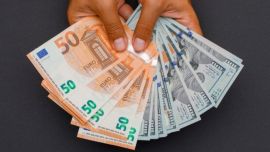There are few reasons to doubt that Boudou is an outright crook. It couldn’t be more painfully ironic that the most damning accusations against him are that he defrauded the State to buy the former Ciccone Calcografica, the only facility capable of printing legal tender in Argentina. His meteoric rise from DJ in Mar del Plata to Director of the National Social Security Administration, then economy minister, and finally CFK’s running mate in 2011 is practically pornographic.
Boudou would ride around life on Harley-Davidson motorcycles and jump up on stage with a fine Gibson Les Paul guitar to celebrate what the Kirchnerites call the ‘década ganada’ (roughly translatable as “the victorious decade”). Cristina saw in him a charismatic and unstructured, and ideologically malleable, “pretty face” that would help with the female vote. And Boudou delivered, as the CFK-Boudou ticket took 54 percent of the vote. Boudou is said to refer to Cristina as “la mami,” much to her son Máximo’s anger.
Behind the scenes, Boudou had put together a network of associates and shell companies run by his buddy José María Nuñez Carmona (who was also arrested on Friday), Alejandro Vandenbroele (who was accused by ex-wife Laura Muñoz of being the VP’s frontman in Revista Noticias in 2012), and even his exgirlfriend, journalist Agustina Kämpfer.
Through a shell company named The Old Fund and a network of firms named for Colorado ski resorts, Boudou and his acolytes were part of a criminal racket that allowed them to live the big life. Their arrogance was such that they didn’t even try to cover their tracks. Vandenbroele, who testified he didn’t even know Boudou personally, paid for the former vice-president’s cable TV service and expenses in his Puerto Madero apartment. Boudou is accused of using insider information to buy sovereign debt ahead of Argentine’s debt swap, of taking bribes in the restructuring of Formosa Province’s debt restructuring, and the shady acquisition of luxury vehicles while heading the Economy Ministry. He cannot justify his net worth and his tax filings are full of holes. Good riddance.
Yet, Judge Ariel Lijo has had all this evidence at his disposal for years. On Wednesday, Lijo and fellow Federal Judge Daniel Rafecas were accused at the Council of Magistrates for purposefully “delaying” 28 and six cases respectively over the past decade, many of those politically sensitive. There is no doubt that Lijo and the rest of the federal Jjudges, acknowledging the changing winds, have sped up their work. It would have been courageous to investigate corruption in real time, particularly when the evidence is staggering.
The cases against Julio De Vido and his entourage (Ricardo Jaime, José López, and others), Patagonian businessman Lázaro Báez, and corrupt union leaders like Omar “the Horse” Suárez and Juan Pablo “the Foot” Medina all share the same pattern: years of delays and a sudden acceleration as Macri solidifies his power.
If President Macri and his team want to prove they are really different from traditional Argentine politicians, they need to seriously reform the legal system, getting rid of “political opportunists” (as Elisa Carrió called Lijo on Friday) and changing them for brave and ethical judges like Brazil’s Sergio Moro.





















Comments